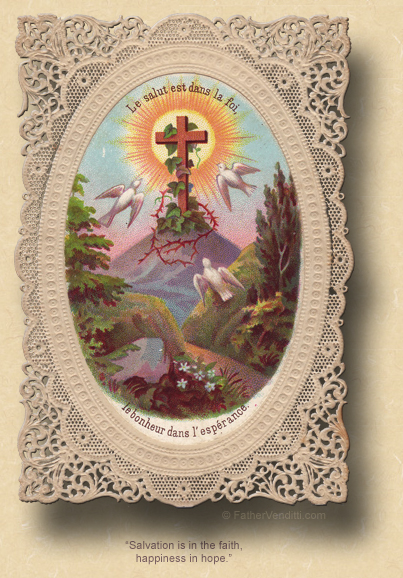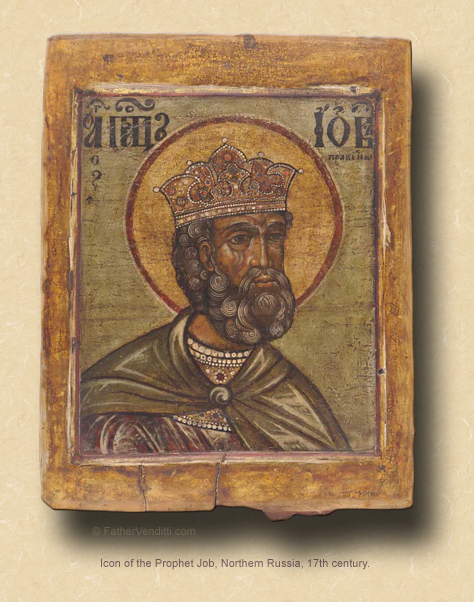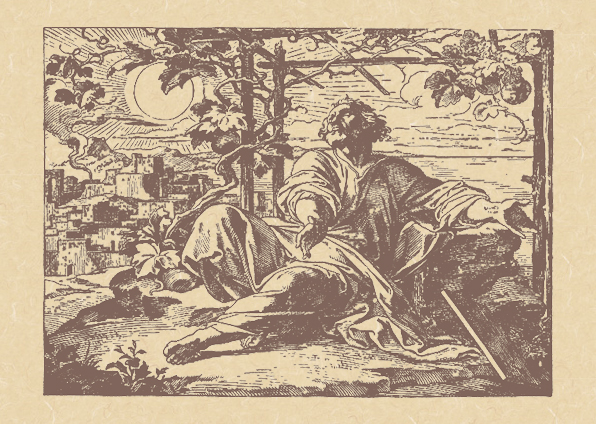The Most Important Man Who Never Was.
The Memorial of Saint Vincent de Paul, Priest.*
Lessons from the secondary feria, according to the ordinary form of the Roman Rite:
• Job 3: 1-3, 11-17, 20-23.
• Psalm 88: 2-8.
• Luke 9: 51-56.
|
…or, from the proper:
• I Corinthians 1: 26-31.
• Psalm 112: 1-9.
• Matthew 9: 35-38.
…or, any lessons from the common of Pastors for Missionaries, or the common of Holy Men & Women for Those who Practiced Works of Mercy.
|
The Third Class Feast of Saints Cosmas & Damian, Martyrs.**
First & third lessons from the common "Sapiéntia…" of Many Martyrs, Gradual from the proper, according to the extraordinary form of the Roman Rite:
• Wisdom 5: 16-20.
• Psalm 33: 18-19.
• Luke 6: 17-23.
The Nineteenth Tuesday after Pentecost; the Feast of the Holy Martyr Callistratus & His Companions; and, the Feast of Our Venerable Father Nilus, Founder & Hegumen of the Grottaferrata Monastery.***
Lessons from the pentecostarion, according to the Ruthenian recension of the Byzantine Rite:
• Philippians 2: 16-23.
• Luke 5: 12-16.
FatherVenditti.com
|
 9:25 AM 9/27/2016 — All this week the first lessons for Mass are from the Book of Job. Written in Hebrew, but in a kind of Hebrew that indicates a Palestinian origin, and laced through with references to the Book of the Prophet Jeremiah, it was clearly written sometime after the Babylonian Exile, but before the Greek influences that colored the language of the Book of Ecclesiastes, from which we read last week. So, we can confidently date Job to sometime after 538 BC. 9:25 AM 9/27/2016 — All this week the first lessons for Mass are from the Book of Job. Written in Hebrew, but in a kind of Hebrew that indicates a Palestinian origin, and laced through with references to the Book of the Prophet Jeremiah, it was clearly written sometime after the Babylonian Exile, but before the Greek influences that colored the language of the Book of Ecclesiastes, from which we read last week. So, we can confidently date Job to sometime after 538 BC.
The human author never gives his name nor any other information about himself; all we know about him is what comes out in his writing, which happens to be a great deal. The masterpiece he created shows him to be a man of very deep feelings which he’s able to express in a most poetic way. In fact, the Book of Job is one very long and painstakingly structured dramatic poem: the prologue, which we heard yesterday, sets out the problem; the middle section of the book, the beginning of which we just heard, has the characters in the book attempting to wrestle with the problem; and the final section is a return to the main theme of the prologue to show the problem’s resolution. This middle section, from which we’re now reading, is itself structured in the form of three discourses in which Job’s three friends take turns speaking to him about his problem and listening to his answers.
And the problem the book deals with is an all too familiar one, in fact, the quintessential crisis of faith: why do bad things happen to good people? Meet anyone who’s been away from the Church and the sacraments for many years, and you’ll meet someone who is convinced that God let him down. The book is clearly a piece of fiction;—the human author never means us to believe there actually was such a person as Job—Job has been invented to make a point. Unfortunately, the point never really gets made: as we read though it and hear Job’s sometimes moving, sometimes comic, answers to his friends arguments, our excitement builds as we anticipate a grand resolution which will finally, once and for all, answer this universal question; but, when we finally get to the epilogue, we’re disappointed to learn that the answer never comes. Part of the reason for this we touched on last week when we were looking at two other books which form what is called the “Wisdom Literature” of the Bible, of which Job is a part: the Jewish people had no concept of an afterlife until the advent of the Pharisees some sixty years or so before the time of our Lord, so the idea that we suffer in this world in order to be rewarded in the next is an insight that escapes Job.  The conclusion to the book, in which Job has everything he’s lost restored to him, is a deus ex machina which gives the impression that all we have to do is persevere in faith and everything will end up OK. At no time does the book even attempt to actually answer the question posed at the beginning: why do bad things happen to good people. The conclusion to the book, in which Job has everything he’s lost restored to him, is a deus ex machina which gives the impression that all we have to do is persevere in faith and everything will end up OK. At no time does the book even attempt to actually answer the question posed at the beginning: why do bad things happen to good people.
That’s not to say the book doesn’t have a spiritual value, because it does, but it’s one that needs to be colored by the life and ministry of our Blessed Lord. We first looked at Job in this chapel back when we were reading from the Book of the Prophet Jonah. Both men are presented to us as polar opposites: Jonah is a bitter and angry man, and Job is a pious innocent; both men suffer great loss and have bad things happen to them, but they react in totally different ways. Jonah, in his bitterness, won’t talk to God and cuts off all contact with Him, even when God tries to reach out to him in the end, and the book ends with Jonah estranged from God; Job never stops praying, and ends up having everything restored to him. In fact, Job’s statement of faith in the very first chapter, which we heard in yesterday’s Mass, is almost impossible to comprehend given the fact he doesn’t believe in an afterlife:
Naked came I out of my mother’s womb, and naked shall I return thither: the Lord gave, and the Lord hath taken away: as it hath pleased the Lord so is it done: blessed be the name of the Lord (Job 1: 21 Douay-Rheims).
That is simply not a faith to which any of us can relate without some concept of a resurrection from the dead.
Today’s psalm sounds like it could have been written by Job, which is probably why it’s included here:
Lord God, day and night I cry bitterly to thee; let my prayer reach thy presence, give audience to my entreaty, for indeed my heart is full of trouble. My life sinks ever closer to the grave; I count as one of those who go down into the abyss, like one powerless. As well lie among the dead, men laid low in the grave, men thou rememberest no longer, cast away, now, from thy protecting hand (Psalm 88: 2-6 Knox).
More than any other, Psalm 88 is one of the most depressing statements made in the Bible, but the response we gave to it is what makes it readable: Intret in conspéctu tuo orátio mea, Dómine. “Let my prayer come before you, Lord.” What was the difference between Jonah and Job? Jonah stopped praying, Job didn’t.
In retrospect, it’s probably a good thing that the Book of Job doesn’t answer the question we all want answered because to answer it would be to make faith superfluous. After all, the virtue of Hope only has meaning within the context of our Lord’s Passion, death and resurrection. The human author of Job tries his best, but is never able to actually reach a conclusion because, not being a Christian, he has no way to process that virtue. Jonah, on the other hand, doesn’t even try; he just gives up on day one and ends up hating God. At least Job makes the attempt.
The lesson for us here is to recognize how incomprehensible the problems of life are without Christ in our lives and heaven in our sights. Today’s Gospel lesson begins with the line: “When the days for Jesus to be taken up were fulfilled, he resolutely determined to journey to Jerusalem” (Luke 9: 15 RM3). The disciples traveling with Him, knowing what awaited our Lord there, couldn’t understand this because even they had no concept of the resurrection, and thus also could not process the virtue of Hope. When we travel along with our Lord, we’re walking toward Jerusalem, too; we’re walking toward the Cross. But we want to, because we know that the Way of the Cross is the road to heaven.

* A secular priest of the Archdiocese of Paris, Vincent de Paul was the founder of the Priests of the Missions, known as the Lazarists (in this country, the Vincentians), and, along with Louise de Marillac, the Daughters of Charity. He died in 1660, and Leo XIII proclaimed him the patron of all charitable associations.
** Cosmas and Damien were brothers and physicians born in Syria, known in the Eastern Churches as the "unmercenaries" because of their devotion and care for the sick poor. They were tortured and beheaded in Cilicia under Diocletian by order of the prefect Lysias in the year 283. The are specifically mentioned both in the Roman Canon and in the “proscomedia” (preparation rites) of the Liturgy of John Chrysostom.
*** Callistratus and his companions were martyred in the city of Byzantium under Diocletian toward the beginning of the fourth century.
Born in the year 910, Saint Nilus the Younger (in Italian: San Nilo di Rossano), was a monk, abbot, and founder of Italo-Greek monasticism in southern Italy. He is remembered principally as the founder of the monastery of Grottaferrata near Frascati, and is counted the first abbot. The abbey continues to this day. He spent the end of his life partly in the Sant'Agata monastery in Tusculum and partly in a hermitage at Valleluce near Gaeta. He died in the Sant'Agata monastery in 1005. Born in Calabria in that portion of the region which belongs to the Italo-Byzantine Catholic Church, he is regarded as one of that Church's most important saints. Cf. the footnote attached to the post here for more information about this Eastern Catholic Church.
|

